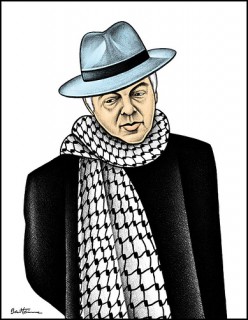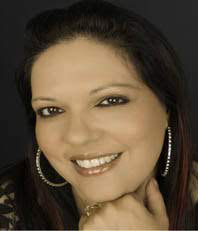By Aditi Bhaduri — Palestine Monitor
“We want social justice for all”

Mustafa Barghouti, MD: He is articulate, courteous, handsome and suave. A medical doctor by profession he is also a member of the Palestinian Legislative Council and was candidate for the Presidency of Palestinian Authority in 2005. Fifty-six-year-old Mustafa Barghouti wears many hats, but what he most represents is the hope of an emerging third power for his Palestinian people fed-up of the Fatah-Hamas binary.
In Delhi recently to attend a conference on a Just Peace for Palestine, he modestly downplays the significance of his party — the Palestinian National Initiative (PNI), of which he is currently the Chairman.
Barghouti founded the party along with the late Edward Said and Haider Abdel Shafi, who had headed the Madrid delegation in 1990. “We have the support of hundreds of intellectual and activists among the Palestinians in the territories and in the diaspora. Our programme is to end the occupation of our land and people by Israel; ensure social justice for all — women, workers, youth, handicapped inside Palestine; and build a democracy — Palestine should be a democracy. Our struggle is based on non-violent resistance, national unity, and a powerful solidarity campaign which includes the boycott, divestment and sanctions (BDS) against Israel campaign.” He stresses the fact that “80 per cent of the party’s members are people below the age of 24 and women”. It is obviously a rising third force in Palestinian politics.
The party, established in 2002, was in part a critique of the Olso process, which Barghouti and Said had vociferously opposed (Barghouti had left the communist party because it was a party to the Oslo accords) , and partly a response to the emerging internal conflicts in Palestinian politics.
“The Palestinian Liberation Organisation (PLO) is the umbrella organisation of all the Palestinian organisations but unfortunately, over the last 20 years since Oslo, the PLO seems to have stopped developing. It has become marginalised and minimalised for the sake of the Palestinian Authority, which was a big mistake. We have to try and open up the PLO to more pluralism and more parties.” The PNI, surprisingly, is not part of the PLO. He also objects to the PLO not holding elections for a while. A bitter critic of Israel’s policies towards Palestinians and a passionate champion of the Palestinian cause, he thinks the peace process is “useless while Israel continues to have and build settlements. The reality is that we have a biased mediator. The peace process has become a substitution to peace, an addiction of the international community to absolve themselves of the guilt of the suffering of Palestinians.”
He candidly accepts Palestinian responsibility for the almost defunct process. “The Oslo accords were the worst that could happen to us. Arafat himself had confessed to me that it was a trap. Since Oslo, the Israeli economy quadrupled and it opened up ways to establish relationships with India and China. I am ready to accept two-State solution but it seems to be dying and we will go back to one-State solution. But one thing that Palestinians will never accept is to be slaves of the occupation.”
So how did he become an activist? “I have been active since 1967 when I was 13.” When Israel captured the West Bank from Jordan in the 1967 war, Barghouti was just a student but he realised that the “Palestinian story had become one of self-reliance and self-mobilisation”. “Till then we had expected that the Arab world would help us, but that war proved we were on our own.”
As a doctor Barghouti helped establish the Palestinian Medical Relief Society 30 years ago. “We initiated a new concept of primary healthcare and also initiated women medical workers.” He moved through almost every village and town in the Palestinian territories, and “saw the reality of Palestine” – something that strengthened his resolve to serve his people. In 1989, he became one of the founders of the Health, Development, Information and Policy Institute, a think-tank representing an alliance of 90 Palestinian community organisations.
He was nominated for the 2010 Nobel Peace Prize for his non-violent resistance. “We believe that non-violence is the most effective method of resistance and much of our struggle has been non-violent,” he says recalling the 1936 Arab strike against the British in Palestine and the first intifadah that broke out in the Gaza strip and the West Bank in the 1980s.
Barghouti has been engaging with many younger Palestinians in non-violent resistance against Israeli policies like the dividing wall, unfair economic practices and collective punishment. “We created a movement against the wall with demonstrations, sittings, even demolishing a little bit of the wall with our bare hands (near the village of Neilin not far from Ramallah). We once removed barricades near Bethlehem.” He was among the 26 people on the very first flotilla that tried to carry humanitarian aid to the people of Gaza in 2008. In September Israel prevented a Jewish flotilla from reaching Gaza.
He is also spearheading a movement for the boycott of Israeli products in the West Bank. “We are planning to launch a big campaign for the boycott of fruit juice from Israel,” he says. Will that be feasible for Palestinian economy?
“If we increase local production by even 5 per cent, we would increase local employment, which is a pressing need.” His party is also campaigning for the government to start a students’ education fund, for he finds the ‘Palestinian Authority’ spending too much on security which actually supports the (Israeli) occupation. In fact, he feels that the Authority should “also boycott security cooperation with Israel, which is aimed more at protecting Israeli interests.”
Barghouti’s PNI also helped mediate the Mecca Agreements in 2007 between the Hamas and the PLO. But, wistfully, he acknowledged that the unified “government has been marginalised since the blockade imposed by Israel”. “Now the only way ahead is to bring back democracy and have presidential and parliamentary elections that have been cancelled. Even municipality elections have been cancelled by the Palestinian Authority. Hamas and Fatah — both are making a big mistake.”
Another contribution (which he does not mention but an American friend accompanying him does) is to get Nelson Mandela’s name removed from the US State list of terrorists, something he pointed out through a CNN interview!
Asked about his expectations from the Arab world and if it had lived up to it, pat comes the response: “The Arab world could have done much more for the Palestinians. We expect them to join the boycott and divestment campaign against Israel,” but he remains realistic enough to understand that “while some will others won’t”. “Our region has three forces operating in it — Iran, Turkey and Israel… The Arab world is marginalised and we need democracy in the Arab world. Lack of democracy is a major problem in our part of the world.”
And then he wistfully says, “You do not know what you have in India. You are very lucky. In Palestine even some municipalities have not had elections for the last 13 years. In the 1996 elections there was great enthusiasm amongst the people, even though the election was rigged. Still people had so much hopes and expectations. We need not just a State but a democratic one.”
On his expectations from India, Barghouti says, “We feel sorry for India’s shift… this is not the traditional Indian policy but we Palestinians erred in Oslo where we helped this shift. Oslo had also opened ways for Arab and Muslim countries to establish diplomatic and trade ties with Israel. So, of course, we cannot blame India, which has followed the path taken by some Arab and Muslim countries like Egypt and Jordan.” However, he feels that the “time has come for civil society to raise their voice,” and stresses that he is “not pessimistic. It always begins slow, with the left parties first voicing support for national liberation movements, then civil society lends its voice and once that happens, I believe that things will change.”
How ethical does he feel the BDS campaign is, given that there are organisations and individuals inside Israel who oppose their government’s policies vis-à-vis the Palestinians? “The peace movement inside Israel is mostly about individuals, and they also support BDS. There will always be good people everywhere. I have more faith in the Jewish diaspora, who I find more sensitive.” After all, he says, “the Palestinian struggle for me is not about nationalism but about justice.”
Aditi Bhaduri’s article first appeared in The Hindu Business Line
Aditi Bhaduri is an independent journalist and researcher based in India who writes for the Indian and international print and electronic media. With a background in international relations, she began her writing career by covering the Middle East. Currently her work focuses on conflict, peace, displacement and gender. Women’s issues form an important and integral part of her work and she acts as a gender consultant to various nongovernmental organizations. Aditi is also a member of several civil society initiatives in India. She was till recently on the editorial board of Refugee Watch.
More from Barghouti:
Israel/Palestine by Mustafa Barghouti 1/5
[youtube TlRJ8VUeW4Q]
Israel/Palestine by Mustafa Barghouti 2/5
[youtube zFARLwDFg9M]
Israel/Palestine by Mustafa Barghouti 3/5
[youtube Vll-whWWbK0]
Isreal/Palestine by Mustafa Barghouti 4/5
[youtube hiUmDAdkxy4]
Israel/Palestine by Mustafa Barghouti 5/5
[youtube U9YHZDg5itQ]
Related Post:
Barghouti says declare Palestinian state immediately 13Oct10

Debbie Menon is an independent writer based in Dubai. Her main focus are the US-Mid- East Conflicts. Her writing has been featured in many print and online publications.
Her writing reflects the incredible resilience, almost superhuman steadfastness of the occupied and oppressed Palestinians, who are now facing the prospect of a final round of ethnic cleansing. She is committed to exposing Israel’s Lobbies’ control of ‘U.S. Middle East Policy. Control’ which amounts to treason by the Zionist lobbies in America and its stooges in Congress, and that guarantees there can never be a peaceful resolution of the Israeli-Palestinian conflict, only catastrophe for all, in the region and the world.
Her mission is to inform and educate internet viewers seeking unfiltered information about real events on issues of the US/Middle East conflicts that are unreported, underreported, or distorted in the American media. PS: For those of her detractors that think she is being selective and even “one-sided,” tough, that is the point of her work, to present an alternative view and interpretation of the US-Israel-Middle East conflict, that has been completely ignored in mainstream discourse.
The purpose is to look at the current reality from a different and critical perspective, not to simply rehash the pro-US/Israel perspective, smoke and mirrors that has been allowed to utterly and completely dominate Mainstream discourse.
ATTENTION READERS
We See The World From All Sides and Want YOU To Be Fully InformedIn fact, intentional disinformation is a disgraceful scourge in media today. So to assuage any possible errant incorrect information posted herein, we strongly encourage you to seek corroboration from other non-VT sources before forming an educated opinion.
About VT - Policies & Disclosures - Comment Policy



